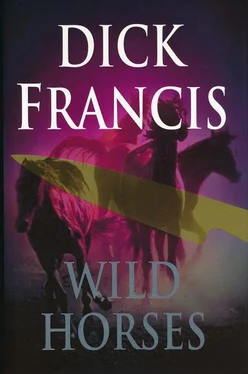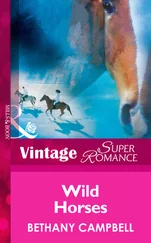They understood without trouble. Our young horsemaster said, ‘Who is going to stand in for Ivan?’
‘I am,’ I said. ‘I’m not as broad-shouldered as him or as Nash, but I’ll be wearing a jacket like the one Nash usually wears as the trainer. I’ll be riding the horse Ivan rode. When we’re ready with the cameras, the man playing the knife-attacker will mount and ride that slow old bay that finished last in our race at Huntingdon. The lad who usually rides him will be standing behind the cameras, out of shot. Any questions?’
One asked, ‘Are you going to chase him down the hill on the camera truck, like last week?’
‘No,’ I said. ‘He will gallop off down the hill. The camera will film him.’
I handed over command, so to speak, to the horsemaster, who organised the mounting and departure of the string. Ed and Moncrieff were already on the Heath. I went into the wardrobe section to put on Nash’s jacket and, Ridley being ready, took him with me in my car up the road to the brow of the hill. Ridley and I, out of the car, walked over to the circling horses, stopping by the camera truck.
‘What we need,’ I told Ridley, ‘is for you to ride into the group from somewhere over there... ’ I pointed. ‘Trot into the group, draw a make-belief knife from a sheath on your belt, slash at one of the group as if you intended to wound him badly, and then, in the ensuing mêlée, canter off over the brow of the hill and down the wide training ground towards the town. OK?’
Ridley stared, his eyes darkly intense.
‘You will slash at me , OK? I’m standing in for Nash.’
Ridley said nothing.
‘Of course,’ I told him pleasantly, ‘when this scene appears in the finished film it will not look like one smooth sequence. There will be flashes of the knife, of horses rearing, of jumbled movement and confusion. There will be a wound. There will be blood. We will fake those later.’ Ed brought various props across to where I stood with Ridley, and handed them to him one by one.
‘Make-believe knife in sheath on belt,’ Ed said, as if reading from a list. ‘Please put on the belt.’
As if mesmerised, Ridley obeyed.
‘Please practise drawing the knife,’ I said.
Ridley drew the knife and looked at it in horror. The production department had faithfully reproduced the American trench knife from my drawing, and although the object Ridley held was light-weight and of painted wood, from three paces it looked like a heavy knuckleduster with a long blade attached to its index finger side.
‘Fine,’ I said non-committally. ‘Put it back in its sheath.’
Ridley fumbled the knife back into place.
‘Helmet,’ Ed said, holding it out.
Ridley buckled on the helmet.
‘Goggles,’ Ed offered.
Ridley put them on slowly.
‘Gloves.’
Ridley hesitated.
‘Anything the matter?’ I asked.
Ridley said ‘No’ hoarsely, and accepted a leg-up onto our slowest nag.
‘Great,’ I said, ‘off you go, then. When Ed yells ”Action”, just trot straight towards me, draw the knife, take a slash, and canter away fast towards Newmarket. Do you want a rehearsal, or do you think you can get it right first time?’
The helmeted, be-goggled, gloved figure didn’t respond.
‘We’ll take a bet you can get it right,’ I said.
Ridley seemed incapable of action. I asked the lad whose horse he was riding to lead him over to the starting point, and then let go and clear the shot. While the lad intelligently followed the instruction, the lad on Nash’s horse dismounted and gave me a leg-up. The cracked rib tugged sharply. I lengthened the stirrup leathers. Moncrieff opened his floodlights to bathe the scene and augment the daylight.
Ed yelled ‘Action.’
Ridley Wells kicked his horse into a canter, not a trot. He tugged the knife free with his right hand while holding the reins with his left. He steered his mount with his legs, expert that he was, and he aimed himself straight at me, as murderously intent as one could have hoped.
The ‘knife’ hit my coat and the carapace beneath and because the imitation blade had no slicing power, the impact knocked the weapon flying out of Ridley’s grasp.
‘I’ve dropped it,’ he shouted, and I pointed to the brow of the hill and yelled at him, ‘Never mind. Gallop.’
He galloped. He sat down low in the saddle and galloped as if it were a genuine escape.
The lads on their horses crowded to the top of the hill to watch, just as before, and this time I went after the fugitive on a horse, not in a truck.
The truck was being driven down the road, camera whirring. The sequence I finally cut together for the film showed ‘Nash’ closely chasing his assailant; Nash with a deep bleeding wound; Nash losing his quarry, blood dripping everywhere; Nash in pain.
‘Lovely stuff ,’ O’Hara breathed when he saw it. ‘God , Thomas... ’
On this Sunday morning, however, there was no blood. I had much the faster horse and I caught up with Ridley before he could vanish into Newmarket’s streets.
He reined furiously to a halt. He tore off the gloves, the goggles and the helmet and threw them on the ground. He struggled out of the anorak we’d dressed him in and flung it away from him.
‘I’ll kill you,’ he said.
I said, ‘I’ll send your fee.’
His bloated face wavered with irresolution as if he couldn’t decide whether or not to attack me there and then, but sense or cowardice prevailed, and he dismounted in a practised slide, facing me, right foot lifting over the horse’s neck. He let go of the reins. He turned his back on me and walked off unsteadily in the direction of Newmarket, as if he couldn’t feel his feet on the ground.
I leaned forward, picked up the dangling reins and walked both horses back to the stables.
The lads came back from the hill chattering like starlings, wide eyed.
‘That man looked just the same!’ ‘He was the same!’ ‘He looked like that man last week!’ ‘Didn’t he look just like the same man?’
‘Yes,’ I said.
From the wardrobe department, where I shed Nash’s coat and helmet, I paid a brief visit upstairs to where the production people were stacking the Athenaeum scenery to one side and filling the space instead with a reproduction of any horse’s box in the stable yard.
As a real natural box was far too small for camera, crew, lights and technicians, let alone a couple of actors, we were fabricating our own version. It was as if a box had been divided into thirds, then spread apart, leaving a large centre area for camera manoeuvering. One third had the split door to the outer world (back projection of the stable yard), one portion contained a manger and water bucket. One, the largest, encompassed the place where a horse would normally stand.
The walls of the box were being constructed of actual whitewashed breeze blocks with an open ceiling of heavy rafters. Bales of hay, at present neatly stacked, would be placed on a platform on the rafters above the action. A floor of concrete sections covered with straw was being slotted into each setting. Artistic hoof marks and other signs of wear and habitation showed that this was a box often in use.
‘How’s it going?’ I asked, looking round with approval.
‘Ready in the morning,’ they assured me. ‘It’ll be as solid as a rock, like you asked.’
‘Great.’
Dorothea’s cheeks were faintly pink; a great advance.
We had a few tears on my arrival, but not the racking distress of two days earlier. As her physical state had grown stronger, so had her strength of mind resurfaced. She thanked me for the flowers I’d brought her and said she was sick of a diet of tomato soup.
Читать дальше












